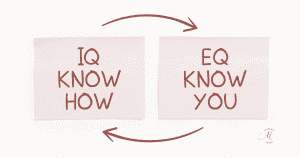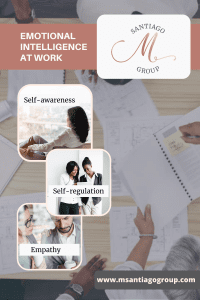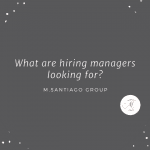How Emotional Intelligence Affects Your Career
Table of Contents:
Emotional Intelligence at Work
As I continue to communicate with HR professionals and hiring managers, a common theme is that emotional intelligence is paramount in today’s candidates. It’s one thing to have the technical skills to do the job. It’s another thing to be knowledgeable and maintain a high EQ comprised of self-awareness, self-regulation, and empathy.

Emotional Empathy at Work with Examples
Self-Awareness
James, an executive director in Chicago, feels like he is an excellent communicator who continually plans, considers others, and articulates company objectives clearly. He believes everything that his teams have achieved is a direct reflection of his leadership skills.
His team isn’t in complete agreement with these statements. They see a visionary and a leader who drives key initiatives, but they think he rushes good ideas and communicates at the last minute, leaving them scrambling to meet lofty goals.
He’s unaware of the flaws in his leadership style and how they affect his team. One way to prevent this is by soliciting anonymous feedback from colleagues and mentors. After all, we can’t fix what we aren’t informed of.
Self-Regulation
Anne, a marketing executive in Ottawa, was selected to transition with her organization after a company acquisition. There are changes to navigate and new team members to adapt to. Not every development is a welcome opportunity, and she finds herself frustrated every week. “Why can’t we do things the way we used to? The corporate culture has changed. I love my job, but I’m having a hard time hiding my irritation.”
Self-regulation is your ability to control your emotions as well as your responses to situations and people. So, while you may feel frustrated at work, there’s an art to reflecting positivity while voicing solutions-focused ideas to your concerns.
Empathy
Jade and Michael, business owners in Indianapolis, significantly downsized their workforce last year. The ones that remained employed all had kids learning from home. The stress was high and so was the demand for productivity from a skeleton crew. As co-owners, they are fighting to keep their doors open and heavily dependent on their teams to be present. They believe working remotely would be a continued distraction. The employees who don’t see the value in working from home. They don’t understand the complexity of balancing work while facilitating the at-home learning of school-aged kids and are vocal about their feelings.
Simon Sinek said, “Empathy is being concerned about the human being, not just their output.” Henry Ford said, “If there is any one secret of success, it lies in the ability to get the other person’s point of view and see things from his angle as well as your own”. No matter what position you find yourself in at work, both of these statements can be great guidelines to displaying empathy at work.

As you consider career coaching, contemplating how emotional intelligence affects your career is incredibly important to your continued success. If your resume needs a style and content update, I am continually creating resume templates and tools to market your accomplishments.



